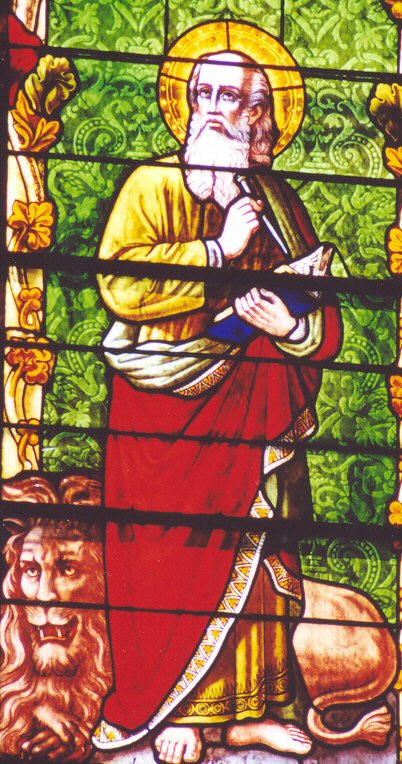Mark 1:40-45
'Be made clean'
by Rev. Jack Peterson, YA
Reprinted by permission of "The Arlington Catholic
Herald"
Home Page
To Sunday Gospel Reflections Index
Mark wrote to explain Christ
to the new Gentile converts.
 A
leper came to Jesus and kneeling down begged him and said, "If you wish, you can
make me clean." Moved with pity, he stretched out his hand, touched him,
and said to him, "I do will it. Be made clean." The leprosy left him
immediately, and he was made clean. Then, warning him sternly, he
dismissed him at once.
A
leper came to Jesus and kneeling down begged him and said, "If you wish, you can
make me clean." Moved with pity, he stretched out his hand, touched him,
and said to him, "I do will it. Be made clean." The leprosy left him
immediately, and he was made clean. Then, warning him sternly, he
dismissed him at once.
He
said to him, "See that you tell no one anything, but go, show yourself to the
priest and offer for your cleansing what Moses prescribed; that will be proof
for them."
The
man went away and began to publicize the whole matter. He spread the
report abroad so that it was impossible for Jesus to enter a town openly.
He remained out-side in deserted places, and people kept coming to him from
everywhere.
Leprosy
was a hideous, dreaded disease at the time of Jesus. It was feared as much as
anything in the ancient world. As a disease, it is devastating. It primarily
affects the skin, the peripheral nerves, the upper respiratory tract and the
eyes. It eats away at the hands, feet and face. It causes a stench and is
contagious, being spread by physical contact.
In
addition to the horrible, physical effects of leprosy, there were social and
religious repercussions. Because it is contagious, lepers were banned from
society and forced to live in colonies outside of towns and villages.
Additionally, a common perspective among many Jews of the day was that leprosy
was a curse from God resulting from personal sin. So, lepers were not allowed in
synagogues or the temple in Jerusalem. They had to dress a certain way and yell
“unclean” whenever they neared another person.
In
the first chapter of Mark’s Gospel, a leper approaches Jesus, kneels down and
begs Him to be made clean. This was a bold move for a leper. His actions,
approaching a crowd and drawing near to a religious leader, went against all
cultural and religious norms. Jesus’ response is equally as bold. The Divine
Physician responds quickly and generously, “I do will it. Be made clean.” Notice
the reference to cleansing: Jesus was indicating that He would offer physical
cleansing/healing and spiritual cleansing, that is, forgiveness.
Next,
Jesus does something completely unexpected. He stretches out His hand and
touches the leper. How long had it been since the leper had been touched by
another human being? How long had he gone without the gift of human touch that
has the power to express care and warmth, bring healing and forgiveness, create
bonds of trust and intimacy. The power of Jesus’ touch was greatly compounded by
the fact that He is the Son of God who came to this earth to reveal God’s
infinite love, extend God’s fathomless mercy and make an offer of abundant life
to those who accept the gift of faith.
In
Mark’s Gospel, Jesus brings this encounter to a common close by saying to him,
“See that you tell no one anything …” Of course, the healed man “went away and
began to publicize the whole matter.” He can’t hold back from sharing with the
world what Jesus of Nazareth had just done for him. The Lord drew close, touched
him, cleansed him of sin, removed his leprosy and sent him off to live a brand
new life. He had to share the good news.
My
brothers and sisters, all of us come before the Lord in a similar situation, do
we not? We all stand before God, broken and hurting in certain ways,
emotionally, physically and/or spiritually. Every one of us comes to Him with
the curse of our sinfulness that distances us from God, and in some
circumstances, actually cuts off our relationship with God. We all need Jesus to
draw near, extend His hand, touch us with His healing, forgiving love, and send
us back into the world with a mission of sharing His truth and love with our
neighbor. “If You wish, You can make me clean.”
Top
Home Page
To Sunday Gospel Reflections Index
 A
leper came to Jesus and kneeling down begged him and said, "If you wish, you can
make me clean." Moved with pity, he stretched out his hand, touched him,
and said to him, "I do will it. Be made clean." The leprosy left him
immediately, and he was made clean. Then, warning him sternly, he
dismissed him at once.
A
leper came to Jesus and kneeling down begged him and said, "If you wish, you can
make me clean." Moved with pity, he stretched out his hand, touched him,
and said to him, "I do will it. Be made clean." The leprosy left him
immediately, and he was made clean. Then, warning him sternly, he
dismissed him at once.